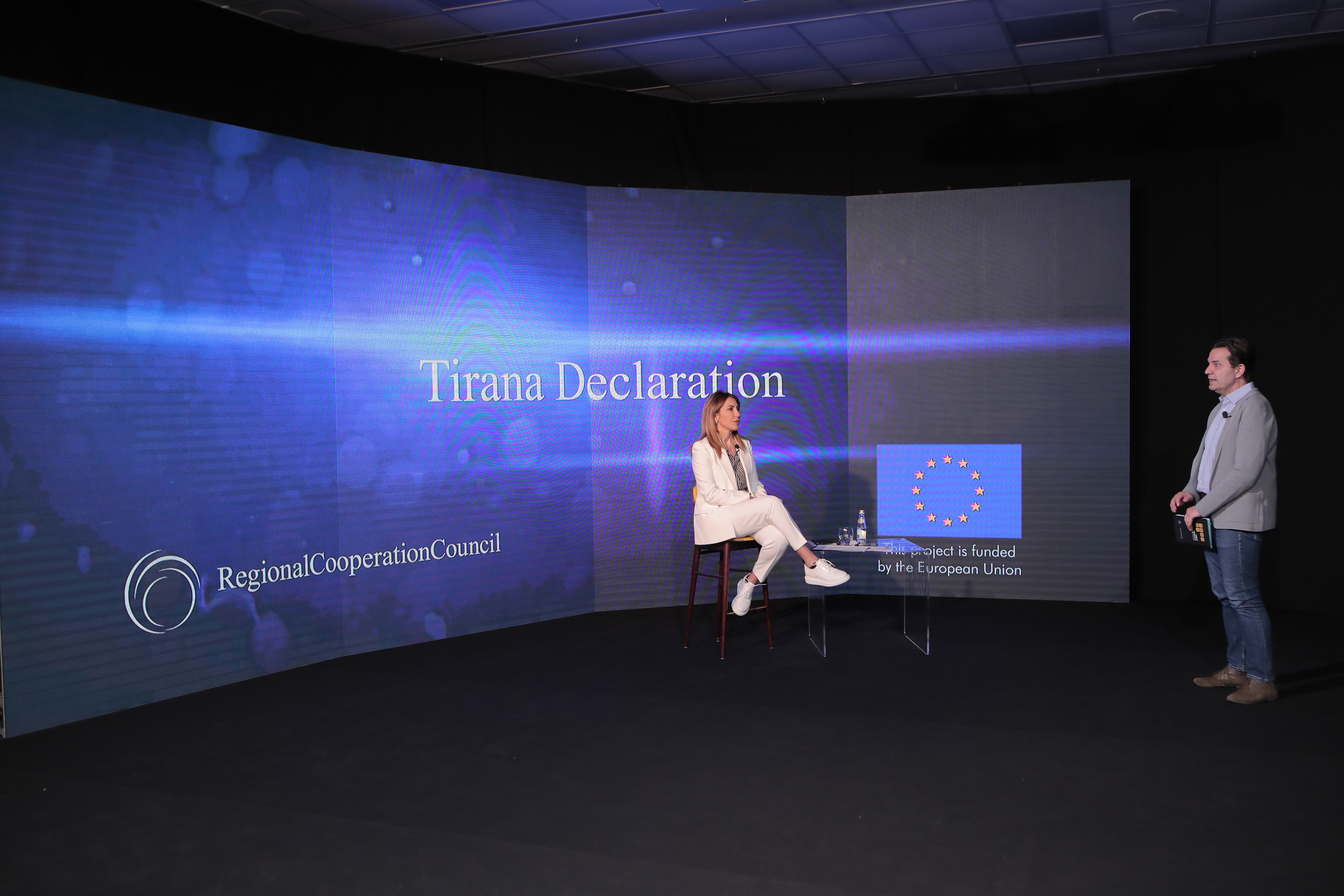Western Balkans endorses Tirana Declaration to Support Tourism in the Region
08 April 2021

Secretary General of the Regional Cooperation Council (RCC) Majlinda Bregu at the high-level Regional Conference ‘Tourism as a Key to Sustainable Development’, where Western Balkans endorsed Tirana Declaration, on 8 April 2021 (Photo: RCC/Ani Media)

RCC Secretary General Majlinda Bregu speaking at the RCC organized high-level Regional Conference ‘Tourism as a Key to Sustainable Development’, marking the finalisation of the RCC’s EU funded Triple P Tourism Development and Promotion project, on 7-8 April 2021 (Photo: RCC/Ani Media)
RCC is refocusing sustainable tourism agenda as an integrated part of Common Regional Market
Sarajevo/Tirana – Ministers and representatives of the six Western Balkans (WB) governments endorsed the Tirana Declaration on supporting sustainable tourism recovery and growth in the region, at the high-level regional conference marking the finalisation of the Regional Cooperation Council (RCC)’s EU-funded Tourism Development and Promotion project, held in Tirana today.
“By completing this project successfully and with its contribution, RCC is preparing for the next step and refocusing the sustainable tourism agenda as an integrated part of the Common Regional Market Action Plan 2021-2024 engaging government, industry, destination communities and other stakeholders to set and develop priorities for implementing a long-term and sustainable regional vision for the tourism sector,” said Majlinda Bregu, RCC Secretary General at the opening of the event.
The Tirana Declaration foresees positioning tourism as a key strategic sector for regional economic recovery and sustainable development; coordinating the reopening and continued operations of the travel and tourism supply chain; facilitating a safe and seamless traveller journey to bolster WB6 recovery and growth; implementing harmonised health and hygiene protocols to align sector recovery efforts and boost traveller confidence; and coordinating promotion and communication to build trust in the WB6 as a responsible, trustworthy and sustainable destination.
Alessandra Viezzer, Deputy Head of Unit Western Balkans Regional Cooperation and Programmes at European Commission (DG NEAR) said that the EU considers Western Balkans a privileged partner. “Before the pandemic, tourism accounted for 15% of the overall GDP in the region and regional cooperation has a potential to provide an invaluable boost to the region’s recovery. I am really convinced that this conference marks the successes achieved, but is also a springboard for the future through joint efforts. Through regional cooperation we can contribute, you can contribute, to the recovery of tourism sector, of the economy and make it really a prime example of the region’s path to EU integration.”
“Tourism needs operation and we need to reinstate operations again. Together we need to do a lot of actions that are going to enable us to restore the confidence in traveling and bring back spirit for travel which trusts the unknown, being happy to discover. We need this spirit to be there because tourism turns to be the greatest generator of positive memories, to contribute to our future, the future of mankind. Tourism is the only positive force that still allows dialogue between countries to happen,” said Alessandra Priante, Director - Regional Department for Europe at World Tourism Organisation (UNWTO) during her opening remarks.
Tourism continues to be one of the sectors hit hardest by the COVID-19 pandemic. Just in the first half of 2020 international visitors decreased by 75% compared to 2019, and the 2020 turnover was at the level of 35%. This is a huge decrease from 12 million visitors in 2019, which brought Western Balkans profit of 7.2 billion euros.
“Tourism can be a powerful catalyst for economic recovery, contributing significantly to the improvement of socio-economic conditions of our people and our focus is to reposition tourism in the region to generate higher growth rates in both visitor arrivals and income for local communities. To accomplish this growth we must ensure that all aspects of the tourism supply chains in the region are fully operational and that we can truly deliver on what we promise when we market WB6 as a multi-destinations tourism area,” concluded Bregu.
This high-level Regional Conference ‘Tourism as a Key to Sustainable Development’ has been organised by the RCC and its Triple P Tourism project funded by the EU and it gathered ministers and high-level officials responsible for tourism in the six Western Balkan economies, as well as members of the WB Tourism Expert Group (TEG), representatives of the European Commission, EU Delegations in the WB, and international organisations working in the tourism industry in the region. The conference also marked the finalisation of the 3-year Triple P Tourism project.
In the three-year period Triple P Tourism project has engaged 100 experts and professionals from approximately 60 civil society organisations in adventure and cultural tourism initiatives. It also supported 4 major cultural and adventure routes, facilitated burdensome administrative procedures in the region, consolidated fragmented tourism products, and supported diversified market offer. Furthermore, the project awarded 36 small grants through 3 grant cycles in the amount of 1.6 mil. EUR and organised the first regional competition Futoruismo and free online webinar series aiming to help Western Balkan tourism sector in post-pandemic.
***
The project was developed by the RCC Secretariat in cooperation with the South East Europe Investment Committee (SEEIC) and its Tourism Expert Group which guided its implementation. The European Union financed the project with EUR 5 million.



